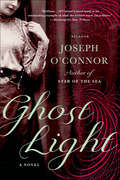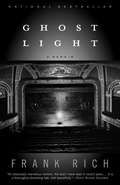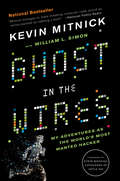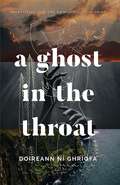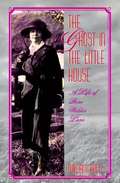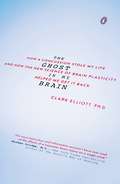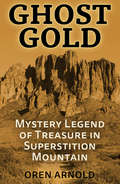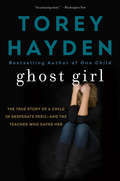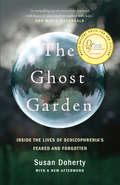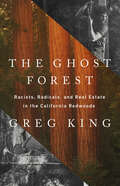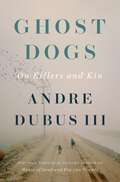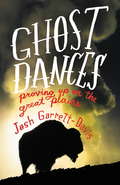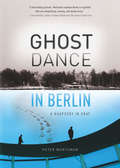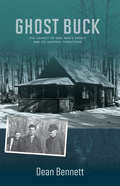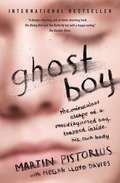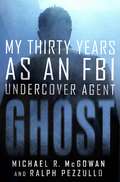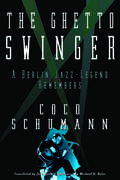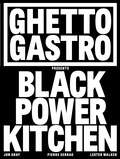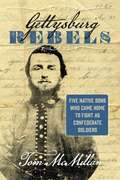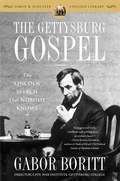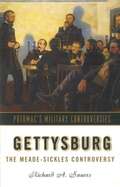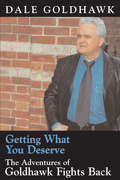- Table View
- List View
Ghost Light: A Novel
by Joseph O'Connor1907 Edwardian Dublin, a city of whispers and rumors. At the Abbey Theatre W. B. Yeats is working with the talented John Synge, his resident playwright. It is here that Synge, the author of The Playboy of the Western World and The Tinker's Wedding, will meet an actress still in her teens named Molly Allgood. Rebellious, irreverent, beautiful, flirtatious, Molly is a girl of the inner-city tenements, dreaming of stardom in America. Witty and watchful, she has dozens of admirers, but it is the damaged older playwright who is her secret passion despite the barriers of age, class, education, and religion.Synge is a troubled, reticent genius, the son of a once prosperous landowning family, a poet of fiery language and tempestuous passions. Yet his life is hampered by conventions and by the austere and God-fearing mother with whom he lives. Scarred by a childhood of immense loneliness and severity, he has long been ill, but he loves to walk the wild places of Ireland. The affair, sternly opposed by friends and family, is turbulent, sometimes cruel, and often tender. 1950s postwar London, an old woman walks across the city in the wake of a hurricane. As she wanders past bomb sites and through the forlorn beauty of wrecked terraces and wintry parks, her mind drifts in and out of the present as she remembers her life's great love, her once dazzling career, and her travels in America. Vivid and beautifully written, Molly's swirling, fractured narrative moves from Dublin to London via New York with luminous language and raw feeling. Ghost Light is a story of great sadness and joy—a tour de force from the widely acclaimed and bestselling author of Star of the Sea.
Ghost Light
by Frank RichThere is a superstition that if an emptied theater is ever left completely dark, a ghost will take up residence. To prevent this, a single "ghost light" is left burning at center stage after the audience and all of the actors and musicians have gone home. Frank Rich's eloquent and moving boyhood memoir reveals how theater itself became a ghost light and a beacon of security for a child finding his way in a tumultuous world. Rich grew up in the small-townish Washington, D.C., of the 1950s and early '60s, a place where conformity seemed the key to happiness for a young boy who always felt different. When Rich was seven years old, his parents separated--at a time when divorce was still tantamount to scandal--and thereafter he and his younger sister were labeled "children from a broken home." Bouncing from school to school and increasingly lonely, Rich became terrified of the dark and the uncertainty of his future. But there was one thing in his life that made him sublimely happy: the Broadway theater.Rich's parents were avid theatergoers, and in happier times they would listen to the brand-new recordings of South Pacific, Damn Yankees, and The Pajama Game over and over in their living room. When his mother's remarriage brought about turbulent changes, Rich took refuge in these same records, re-creating the shows in his imagination, scene by scene. He started collecting Playbills, studied fanatically the theater listings in The New York Times and Variety, and cut out ads to create his own miniature marquees. He never imagined that one day he would be the Times's chief theater critic.Eventually Rich found a second home at Wash-ington's National Theatre, where as a teenager he was a ticket-taker and was introduced not only to the backstage magic he had dreamed of for so long but to a real-life cast of charismatic and eccentric players who would become his mentors and friends. With humor and eloquence, Rich tells the triumphant story of how the aspirations of a stagestruck young boy became a lifeline, propelling him toward the itinerant family of theater, whose romantic denizens welcomed him into the colorful fringes of Broadway during its last glamorous era.Every once in a while, a grand spectacle comes along that introduces its audiences to characters and scenes that will resound in their memories long after the curtain has gone down. Ghost Light, Frank Rich's beautifully crafted childhood memoir, is just such an event.
Ghost Light: A Memoir
by Frank RichThere is a superstition that if an emptied theater is ever left completely dark, a ghost will take up residence. To prevent this, a single "ghost light" is left burning at center stage after the audience and all of the actors and musicians have gone home. Frank Rich's eloquent and moving boyhood memoir reveals how theater itself became a ghost light and a beacon of security for a child finding his way in a tumultuous world. Rich grew up in the small-townish Washington, D.C., of the 1950s and early '60s, a place where conformity seemed the key to happiness for a young boy who always felt different. When Rich was seven years old, his parents separated--at a time when divorce was still tantamount to scandal--and thereafter he and his younger sister were labeled "children from a broken home." Bouncing from school to school and increasingly lonely, Rich became terrified of the dark and the uncertainty of his future. But there was one thing in his life that made him sublimely happy: the Broadway theater. Rich's parents were avid theatergoers, and in happier times they would listen to the brand-new recordings of South Pacific, Damn Yankees, and The Pajama Game over and over in their living room. When his mother's remarriage brought about turbulent changes, Rich took refuge in these same records, re-creating the shows in his imagination, scene by scene. He started collecting Playbills, studied fanatically the theater listings in The New York Times and Variety, and cut out ads to create his own miniature marquees. He never imagined that one day he would be the Times's chief theater critic. Eventually Rich found a second home at Washington's National Theatre, where as a teenager he was a ticket-taker and was introduced not only to the backstage magic he had dreamed of for so long but to a real-life cast of charismatic and eccentric players who would become his mentors and friends. With humor and eloquence, Rich tells the triumphant story of how the aspirations of a stagestruck young boy became a lifeline, propelling him toward the itinerant family of theater, whose romantic denizens welcomed him into the colorful fringes of Broadway during its last glamorous era. Every once in a while, a grand spectacle comes along that introduces its audiences to characters and scenes that will resound in their memories long after the curtain has gone down. Ghost Light, Frank Rich's beautifully crafted childhood memoir, is just such an event.
Ghost in the Wires: My Adventures as the World's Most Wanted Hacker
by William L. Simon Kevin Mitnick Steve WozniakKevin Mitnick was the most elusive computer break-in artist in history. He accessed computers and networks at the world's biggest companies--and however fast the authorities were, Mitnick was faster, sprinting through phone switches, computer systems, and cellular networks. He spent years skipping through cyberspace, always three steps ahead and labeled unstoppable. But for Kevin, hacking wasn't just about technological feats-it was an old fashioned confidence game that required guile and deception to trick the unwitting out of valuable information.Driven by a powerful urge to accomplish the impossible, Mitnick bypassed security systems and blazed into major organizations including Motorola, Sun Microsystems, and Pacific Bell. But as the FBI's net began to tighten, Kevin went on the run, engaging in an increasingly sophisticated cat and mouse game that led through false identities, a host of cities, plenty of close shaves, and an ultimate showdown with the Feds, who would stop at nothing to bring him down. Ghost in the Wires is a thrilling true story of intrigue, suspense, and unbelievable escape, and a portrait of a visionary whose creativity, skills, and persistence forced the authorities to rethink the way they pursued him, inspiring ripples that brought permanent changes in the way people and companies protect their most sensitive information.
A Ghost in the Throat
by Doireann Ní GhríofaA New York Times Notable Book for 2021, this is a contemporary Irish poet's musings and obssession over a seventeenth-century poet's written keen on the murder of her husband. Themes include erasure of a people, of a language, of women; a meditation on motherhood and on translation; and an unforgettable story about finding your voice by freeing another's. The poem at issue is printed on both Gaelic with translation into modern English on pages 284 to 320 and was carefully proofread for accuracy. The Gaelic and English are shown on alternating even (Gaelic) and odd (English translation) pages respectively.
The Ghost in the Little House: A Life of Rose Wilder Lane
by William Holtz"The Little House books, attributed to Laura Ingalls Wilder, are indisputably brilliant classics of children's literature; but the singular attribution is shown to be in error in this meticulous biography of Laura's daughter Rose (1886-1966). Rose shaped every sentence of her mother's reminiscences, transforming rudimentary notes into eloquent books that exquisitely capture a child's perception of pioneer life and express hopes and aspirations at America's bedrock. Rose was an unconventional woman who wrote and travelled extensively and espoused passionately-held libertarian views; her story is fascinating, even without the startling revelation of her authorship." Annotation c. by Book News, Inc. , Portland, Or. Because of the time period in which Rose lived and because the author quotes extensively from her journals, diaries and correspondence, there is a great deal of U.S. and world history in this book, and descriptions of various countries and cities in which she traveled and lived at various times
The Ghost in My Brain: How a Concussion Stole My Life and How the New Science of Brain Plasticity Helped Me Get it Back
by Clark ElliottThe dramatic story of one man's recovery offers new hope to those suffering from concussions and other brain traumas In 1999, Clark Elliott suffered a concussion when his car was rear-ended. Overnight his life changed from that of a rising professor with a research career in artificial intelligence to a humbled man struggling to get through a single day. At times he couldn't walk across a room, or even name his five children. Doctors told him he would never fully recover. After eight years, the cognitive demands of his job, and of being a single parent, finally became more than he could manage. As a result of one final effort to recover, he crossed paths with two brilliant Chicago-area research-clinicians--one an optometrist emphasizing neurodevelopmental techniques, the other a cognitive psychologist--working on the leading edge of brain plasticity. Within weeks the ghost of who he had been started to re-emerge. Remarkably, Elliott kept detailed notes throughout his experience, from the moment of impact to the final stages of his recovery, astounding documentation that is the basis of this fascinating book. The Ghost in My Brain gives hope to the millions who suffer from head injuries each year, and provides a unique and informative window into the world's most complex computational device: the human brain.From the Hardcover edition.
Ghost Gold: Strange Mystery Legend Of Treasure In Superstition Mountain
by Oren ArnoldGhost Gold, first published in 1954, is the story of Arizona’s Superstition Mountain and the Lost Dutchman Mine, a legendary mine containing a rich gold deposit (whether or not the mine does in fact exist remains an unanswered question). In a fascinating look at the mine’s history, author Oren Arnold (1900-1980) recounts the known facts and legends about the exploration and ‘discovery’ of the mine and the fate of some its the notable personalities (such as the “Lost Dutchman” himself—Jakob Walz). Included are 8 pages of illustrations.Author Oren Arnold was an authority on the lore of the West and wrote more than 20 books and many magazine articles.
Ghost Girl: The True Story Of A Child In Desperate Peril - And A Teacher Who Saved Her
by Torey HaydenJadie never spoke. She never laughed, or cried, or uttered any sound. Despite efforts to reach her, Jadie remained locked in her own troubled world . . . until one remarkable teacher persuaded her to break her self-imposed silence.Nothing in all of Torey Hayden’s experience could have prepared her for the shock of what Jadie told her—a story too horrendous for Torey’s professional colleagues to acknowledge. Yet a little girl was living in a nightmare, and Torey responded in the only way she knew how—with courage, compassion, and dedication—demonstrating once again the tremendous power of love and the resilience of the human spirit.
The Ghost Garden: Inside the lives of schizophrenia's feared and forgotten
by Susan DohertyA rare work of narrative non-fiction that illuminates a world most of us try not to see: the daily lives of the severely mentally ill, who are medicated, marginalized, locked away and shunned.Susan Doherty's groundbreaking book brings us a population of lost souls, ill-served by society, feared, shunted from locked wards to rooming houses to the streets to jail and back again. For the past ten years, some of the people who cycle in and out of the severely ill wards of the Douglas Institute in Montreal, have found a friend in Susan, who volunteers on the ward, and then follows her friends out into the world as they struggle to get through their days. With their full cooperation, she brings us their stories, which challenge the ways we think about people with mental illness on every page. The spine of the book is the life of Caroline Evans (not her real name), a woman in her early sixties whom Susan has known since she was a bright and sunny school girl. Caroline had formed a close friendship with Susan and shared stories from her life; through her, we experience what living with schizophrenia over time is really like. She has been through it all, including the way the justice system treats the severely mentally ill: at one point, she believed that she could save her roommate from the devil by pouring boiling water into her ear... Susan interleaves Caroline's story with vignettes about her other friends, human stories that reveal their hopes, their circumstances, their personalities, their humanity. She's found that if she can hang in through the first ten to fifteen minutes of every coffee date with someone in the grip of psychosis, then true communication results. Their "madness" is not otherworldly: instead it tells us something about how they're surviving their lives and what they've been through. The Ghost Garden is not only touching, but carries a cargo of compassion and empathy.
The Ghost Forest: Racists, Radicals, and Real Estate in the California Redwoods
by Greg KingThe definitive story of the California redwoods, their discovery and their exploitation, as told by an activist who fought to protect their existence against those determined to cut them down. Every year millions of tourists from around the world visit California&’s famous redwoods. Yet few who strain their necks to glimpse the tops of the world&’s tallest trees understand how unlikely it is that these last isolated groves of giant trees still stand at all. In this gripping historical memoir, journalist and famed redwood activist Greg King examines how investors and a growing U.S. economy drove the timber industry to cut down all but 4 percent of the original two-million-acre redwood ecosystem. King first examined redwood logging in the 1980s—as an award-winning reporter. What he found in the woods convinced him to leap the line of neutrality and become an activist dedicated to saving the very last ancient redwood groves remaining in private hands. The land grab began in 1849, when a &“green gold rush&” of migrants came to exploit the legendary redwoods that grew along the Russian River. Several generations later, in 1987, Greg King discovered and named Headwaters Forest—at 3,000 acres the largest ancient redwood habitat remaining outside of parks—and he led the movement to save this grove. After a decade of one of the longest, most dramatic, and violent environmental campaigns in US history, in 1999 the state and federal governments protected Headwaters Forest. The Ghost Forest explores a central question, an overhanging mystery: What was it like, this botanical Elysium that grew only along the Northern California coast, a forest so spectacular—but also uniquely valuable as a cornerstone of American economic growth—that in the end it would inspire life-and-death struggles? Few but loggers and surveyors ever saw such magnificent trees, ancient sentinels that, like ghosts, have informed King&’s understanding of the world. On a lifelong journey, King finds himself through the generations, and through the trees.A Next Big Idea Club Must-Read Title
Ghost Dogs: On Killers and Kin
by Andre Dubus IIIFrom the literary master and best-selling author of Townie, reflections on a life of challenges, contradictions, and fulfillments. During childhood summers in Louisiana, Andre Dubus III’s grandfather taught him that men’s work is hard. As an adult, whether tracking down a drug lord in Mexico as a bounty hunter or grappling with privilege while living with a rich girlfriend in New York City, Dubus worked—at being a better worker and a better human being. In Ghost Dogs, Dubus’s nonfiction prowess is on full display in his retelling of his own successes, failures, triumphs, and pain. In his longest essay, “If I Owned a Gun,” Dubus reflects on the empowerment and shame he felt in keeping a gun, and his decision, ultimately, to give it up. Elsewhere, he writes of a violent youth and of settled domesticity and fatherhood, about the omnipresent expectations and contradictions of masculinity, about the things writers remember and those they forget. Drawing upon kindred literary spirits from Rilke to Rumi to Tim O’Brien, Ghost Dogs renders moments of personal revelation with emotional generosity and stylistic grace, ultimately standing as essential witness and testimony to the art of the essay.
Ghost Dances: Proving Up on the Great Plains
by Josh Garrett-DavisA gifted young writer takes a singular journey back to his native Midwestern American Plains. Growing up in South Dakota, Josh Garrett-Davis always knew he would leave. But as a young adult, he kept going back-in dreams and reality and by way of books. With this beautifully written narrative about a seemingly empty but actually rich and complex place, he has reclaimed his childhood, his unusual family-and the Great Plains.Among the subjects and people who bring his Plains to life are the destruction and resurgence of the American bison; his great-great-grandparents' twenty-year sojourn in Nebraska as homesteaders; Native American "Ghost Dancers," who attempted to ward off destruction by supernatural means before the 1890 massacre at Wounded Knee; the political allegory to be found in The Wizard of Oz; and current attempts by ecologists to "rewild" the Plains. GHOST DANCES is a fluid combination of memoir and history and reportage that reminds us that our roots matter-and might even be inspiring and fascinating.
Ghost Dance in Berlin
by Peter WortsmanEvery great city is a restless work in progress, but nowhere is the urban impulse more in flux than in Berlin, that sprawling metropolis located on the fault line of history. A short-lived fever-dream of modernity in the Roaring Twenties, redubbed Germania and primped up into the megalomaniac fantasy of a Thousand-Year Reichstadt in the Thirties, reduced in 1945 to a divided rubble heap, subsequently revived in a schizoid state of post-World War II duality, and reunited in 1989 when the wall came tumbling down - Berlin has since been reborn yet again as the hipster hub of the 21st century. This book is a hopscotch tour in time and space.Part memoir, part travelogue, Ghost Dance in Berlin is an unlikely declaration of love, as much to a place as to a state of mind, by the American-born son of German-speaking Jewish refugees. Peter Wortsman imagines the parallel celebratory haunting of two sets of ghosts, those of the exiled erstwhile owners, a Jewish banker and his family, and those of the Führer's Minister of Finance and his entourage, who took over title, while in another villa across the lake another gaggle of ghosts is busy planning the Final Solution.
Ghost Buck: The Legacy Of One Man's Family And Its Hunting Traditions
by Dean BennettIn Ghost Buck, outdoorsman Dean Bennett takes readers along to the place where he feels most connected to nature and his family--Camp Sheepskin. Guided by his family's camp register, photos, and letters ranging from the 1800s to the present, Bennett reflects on his annual visits to his Western Maine camp since his boyhood. Through intimate narrative, he recalls hunting triumphs and defeats, including the elusive Ghost Buck that haunts the camp's surrounding forest. This multi-generational tale combines memoir, history, and politics as it illustrates the environmental and cultural changes that have altered hunting and the rural culture of the Maine woods. Ghost Buck is not a book about how to hunt, but rather a story of how a tradition like hunting in Maine can forge unshakeable family bonds
Ghost Boy
by Martin PistoriusIn January 1988, aged twelve, Martin Pistorius fell inexplicably sick. First he lost his voice and stopped eating; then he slept constantly and shunned human contact. Doctors were mystified. Within eighteen months he was mute and wheelchair-bound. Martin's parents were told that an unknown degenerative disease had left him with the mind of a baby and he probably had less than two years to live. Martin went on to be cared for at centres for severely disabled children, a shell of the bright, vivacious boy he had once been. What no-one knew is that while Martin's body remained unresponsive his mind slowly woke up, yet he could tell no-one; he was a prisoner inside a broken body. Then, in 1998, when Martin was twenty-three years old, an aromatherapy masseuse began treating him and sensed some part of him was alert. Experts were dismissive, but his parents persevered and soon realised their son was as intelligent as he'd always been. With no memory of the time before his illness, Martin was a man-child reborn in a world he didn't know. He was still in a wheelchair and unable to speak, but he was brilliantly adept at computer technology. Since then, and against all odds, he has fallen in love, married and set up a design business which he runs from his home in Essex.Ghost Boyis an incredible, deeply moving story of recovery and the power of love. Through Martin's story we can know what it is like to be here and yet not here - unable to communicate yet feeling and understanding everything. Martin's emergence from his darkness enables us to celebrate the human spirit and is a wake-up call to cherish our own lives.
Ghost: My Thirty Years as an FBI Undercover Agent
by Ralph Pezzullo Michael R. McGowanThe explosive memoir of an FBI field operative who has worked more undercover cases than anyone in history.Within FBI field operative circles, groups of people known as “Special” by their titles alone, Michael R. McGowan is an outlier. 10% of FBI Special Agents are trained and certified to work undercover. A quarter of those agents have worked more than one undercover assignment in their careers. And of those, less than 10% of them have been involved in more than five undercover cases. Over the course of his career, McGowan has worked more than 50 undercover cases. In this extraordinary and unprecedented book, McGowan will take readers through some of his biggest cases, from international drug busts, to the Russian and Italian mobs, to biker gangs and contract killers, to corrupt unions and SWAT work. Ghost is an unparalleled view into how the FBI, through the courage of its undercover Special Agents, nails the bad guys. McGowan infiltrates groups at home and abroad, assembles teams to create the myths he lives, concocts fake businesses, coordinates the busts, and helps carry out the arrests. Along the way, we meet his partners and colleagues at the FBI, who pull together for everything from bank jobs to the Boston Marathon bombing case, mafia dons, and, perhaps most significantly, El Chapo himself and his Sinaloa Cartel.Ghost is the ultimate insider's account of one of the most iconic institutions of American government, and a testament to the incredible work of the FBI.
The Ghetto Swinger: A Berlin Jazz-Legend Remembers
by John Howard Michael H. Kater Coco Schumann Michaela Haas Max Christian Graeff"From his early enthusiasm for American jazz in Berlin cabarets to his membership of Terezin's celebrated Ghetto Swngers and surviving Auschwitz through his music, to post-war appearances with the likes of Dizzy Gillespie, jazz remains a constant in a remarkable life story."- Ron Simpson, The Jazz RagSchumann's memoir offers an intimate look at the redemptive and sustaining power of music.
Ghetto Gastro Presents Black Power Kitchen
by Jon Gray Pierre Serrao Lester Walker Osayi EndolynNamed a Best Cookbook of 2022 by Barnes & Noble Named a Best Cookbook of Fall 2022 by Food & Wine, Forbes, Philadelphia Inquirer, Publishers Weekly, The Takeout, and moreAn American Library Association CODES Essential Cookbook of the YearShortlisted for The Art of Eating Prize&“This year&’s most important cookbook.&”—Vogue &“Every recipe comes with an immersive story, bringing you closer to the intent behind the dish.&”—The Strategist, The Year&’s Most Giftable Coffee-Table Books&“Featuring vibrant recipes, interviews, art, and photography, this is a compelling culinary manifesto about the nature of Black food. . . . Ghetto Gastro offers an awakening of what Black food was, is, and can become while demonstrating the sheer joy and creativity Black communities generate. With waves of crunch, heat, flavor, and umami, this Bronx culinary collective also inspires discussions about race, history, and long-standing food inequality.&”—Food & WineKnowledge Is Power Part cookbook. Part manifesto. Created with big Bronx energy, Black Power Kitchen combines 75 mostly plant-based, layered-with-flavor recipes with immersive storytelling, diverse voices, and striking images and photographs that celebrate Black food and Black culture, and inspire larger conversations about race, history, food inequality, and how eating well can be a pathway to personal freedom and self-empowerment.Ghetto Gastro Presents Black Power Kitchen is the first book from the Bronx-based culinary collective, and it does for the cookbook what Ghetto Gastro has been doing for the food world in general—disrupt, expand, reinvent, and stamp it with their unique point of view. Ghetto Gastro sits at the intersection of food, music, fashion, visual arts, and social activism. They&’ve partnered with Nike and Beats by Dre, designed cookware sold through Williams-Sonoma and Target, and won a Future of Gastronomy award from the World&’s 50 Best. Now they bring their multidisciplinary approach to a cookbook, with nourishing recipes that are layered with waves of crunch, heat, flavor, and umami. They are born of the authors&’ cultural heritage and travels—from riffs on family dishes like Strong Back Stew and memories of Uptown with Red Velvet Cake to neighborhood icons like Triboro Tres Leches and Chopped Stease (their take on the classic bodega chopped cheese) to recipes redolent of the African diaspora like Banana Leaf Fish and King Jaffe Jollof. All made with a sense of swag.
Gettysburg Rebels: Five Native Sons Who Came Home to Fight as Confederate Soldiers
by Tom McmillanGettysburg Rebels is the gripping true story of five young men who grew up in Gettysburg, moved south to Virginia in the 1850s, joined the Confederate army - and returned "home" as foreign invaders for the great battle in July 1863. Drawing on rarely-seen documents and family histories, as well as military service records and contemporary accounts, Tom McMillan delves into the backgrounds of Wesley Culp, Henry Wentz and the three Hoffman brothers in a riveting tale of Civil War drama and intrigue.
The Gettysburg Gospel: The Lincoln Speech That Nobody Knows
by Gabor BorittThe words Abraham Lincoln spoke at the dedication of the Soldiers' National Cemetery at Gettysburg comprise perhaps the most famous speech in history. It has been quoted by popes, presidents, prime ministers, and revolutionaries around the world. From "Four score and seven years ago. . . " to "government of the people, by the people, for the people," Lincoln's words echo in the American conscience. Many books have been written about the Gettysburg Address and yet, as Lincoln scholar Gabor Boritt shows, there is much that we don't know about the speech. In The Gettysburg Gospel he reconstructs what really happened in Gettysburg, Pennsylvania, on November 19, 1863. Boritt tears away a century of myths, lies, and legends to give us a clear understanding of the greatest American's greatest speech. In the aftermath of the bloodiest battle ever fought in North America, the little town of Gettysburg was engulfed in the worst man-made disaster in U. S. history: close to 21,000 wounded; very few doctors; heroic women coping in houses, barns, and churches turned into hospitals; dead horses and mules rotting in farmyards and fields; and at least 7,000 dead soldiers who had to be dug up, identified, and reburied. This was where Lincoln had to come to explain why the horror of war must continue. Planning America's first national cemetery revitalized the traumatized people of Gettysburg, but the dedication ceremonies overwhelmed the town. Lincoln was not certain until the last moment whether he could come. But he knew the significance of the occasion and wrote his remarks with care -- the first speech since his inauguration that he prepared before delivering it. A careful analysis of the Address and the public reaction to it form the center of this book. Boritt shows how Lincoln responded to the politics of the time and also clarifies which text he spoke from and how and when he wrote the various versions. Few people initially recognized the importance of the speech; it was frequently and, at times, hilariously misreported. But over the years the speech would grow into American scripture. It would acquire new and broader meanings. It would be better understood, but also misunderstood and misinterpreted to suit beliefs very different from Lincoln's. The Gettysburg Gospel is based on years of scholarship as well as a deep understanding of Lincoln and of Gettysburg itself. It draws on vital documents essential to appreciating Lincoln's great speech and its evolution into American gospel. This is an indispensable book for anyone interested in the Gettysburg Address, Abraham Lincoln, the Civil War, or American history.
The Gettysburg Gospel
by Gabor BorittThe words Abraham Lincoln spoke at the dedication of the Soldiers' National Cemetery at Gettysburg comprise perhaps the most famous speech in history. It has been quoted by popes, presidents, prime ministers, and revolutionaries around the world. From "Four score and seven years ago..." to "government of the people, by the people, for the people," Lincoln's words echo in the American conscience. Many books have been written about the Gettysburg Address and yet, as Lincoln scholar Gabor Boritt shows, there is much that we don't know about the speech. In The Gettysburg Gospel he reconstructs what really happened in Gettysburg, Pennsylvania, on November 19, 1863. Boritt tears away a century of myths, lies, and legends to give us a clear understanding of the greatest American's greatest speech. In the aftermath of the bloodiest battle ever fought in North America, the little town of Gettysburg was engulfed in the worst man-made disaster in U.S. history: close to 21,000 wounded; very few doctors; heroic women coping in houses, barns, and churches turned into hospitals; dead horses and mules rotting in farmyards and fields; and at least 7,000 dead soldiers who had to be dug up, identified, and reburied. This was where Lincoln had to come to explain why the horror of war must continue. Planning America's first national cemetery revitalized the traumatized people of Gettysburg, but the dedication ceremonies overwhelmed the town. Lincoln was not certain until the last moment whether he could come. But he knew the significance of the occasion and wrote his remarks with care -- the first speech since his inauguration that he prepared before delivering it. A careful analysis of the Address and the public reaction to it form the center of this book. Boritt shows how Lincoln responded to the politics of the time and also clarifies which text he spoke from and how and when he wrote the various versions. Few people initially recognized the importance of the speech; it was frequently and, at times, hilariously misreported. But over the years the speech would grow into American scripture. It would acquire new and broader meanings. It would be better understood, but also misunderstood and misinterpreted to suit beliefs very different from Lincoln's. The Gettysburg Gospel is based on years of scholarship as well as a deep understanding of Lincoln and of Gettysburg itself. It draws on vital documents essential to appreciating Lincoln's great speech and its evolution into American gospel. This is an indispensable book for anyone interested in the Gettysburg Address, Abraham Lincoln, the Civil War, or American history.
The Gettysburg Gospel
by Gabor BorittThe words Abraham Lincoln spoke at the dedication of the Soldiers' National Cemetery at Gettysburg comprise perhaps the most famous speech in history. It has been quoted by popes, presidents, prime ministers, and revolutionaries around the world. From "Four score and seven years ago..." to "government of the people, by the people, for the people," Lincoln's words echo in the American conscience. Many books have been written about the Gettysburg Address and yet, as Lincoln scholar Gabor Boritt shows, there is much that we don't know about the speech. In The Gettysburg Gospel he reconstructs what really happened in Gettysburg, Pennsylvania, on November 19, 1863. Boritt tears away a century of myths, lies, and legends to give us a clear understanding of the greatest American's greatest speech. In the aftermath of the bloodiest battle ever fought in North America, the little town of Gettysburg was engulfed in the worst man-made disaster in U.S. history: close to 21,000 wounded; very few doctors; heroic women coping in houses, barns, and churches turned into hospitals; dead horses and mules rotting in farmyards and fields; and at least 7,000 dead soldiers who had to be dug up, identified, and reburied. This was where Lincoln had to come to explain why the horror of war must continue. Planning America's first national cemetery revitalized the traumatized people of Gettysburg, but the dedication ceremonies overwhelmed the town. Lincoln was not certain until the last moment whether he could come. But he knew the significance of the occasion and wrote his remarks with care -- the first speech since his inauguration that he prepared before delivering it. A careful analysis of the Address and the public reaction to it form the center of this book. Boritt shows how Lincoln responded to the politics of the time and also clarifies which text he spoke from and how and when he wrote the various versions. Few people initially recognized the importance of the speech; it was frequently and, at times, hilariously misreported. But over the years the speech would grow into American scripture. It would acquire new and broader meanings. It would be better understood, but also misunderstood and misinterpreted to suit beliefs very different from Lincoln's. The Gettysburg Gospel is based on years of scholarship as well as a deep understanding of Lincoln and of Gettysburg itself. It draws on vital documents essential to appreciating Lincoln's great speech and its evolution into American gospel. This is an indispensable book for anyone interested in the Gettysburg Address, Abraham Lincoln, the Civil War, or American history.
Gettysburg: The Meade-Sickles Controversy
by Richard A. SauersThe book examines in depth the dissension among Federal generals that threatened the union's army ability to defeat the Confederacy.
Getting What You Deserve: The Adventures of Goldhawk Fights Back
by Dale GoldhawkFor 12 years Dale Goldhawk journeyed through the streets of Canada and into the hearts of thousands of Canadians. Written in Goldhawk’s punchy, to-the-point style, this book links his life as a journalist and advocate with those who were his clients. For the first time, he reveals the background battles and adventures he and his team had, as well as the stories of his clients and where they are today. The narrative paints a vivid picture of how working on Canada’s most original advocacy team changed their lives as journalists and Canadians.
